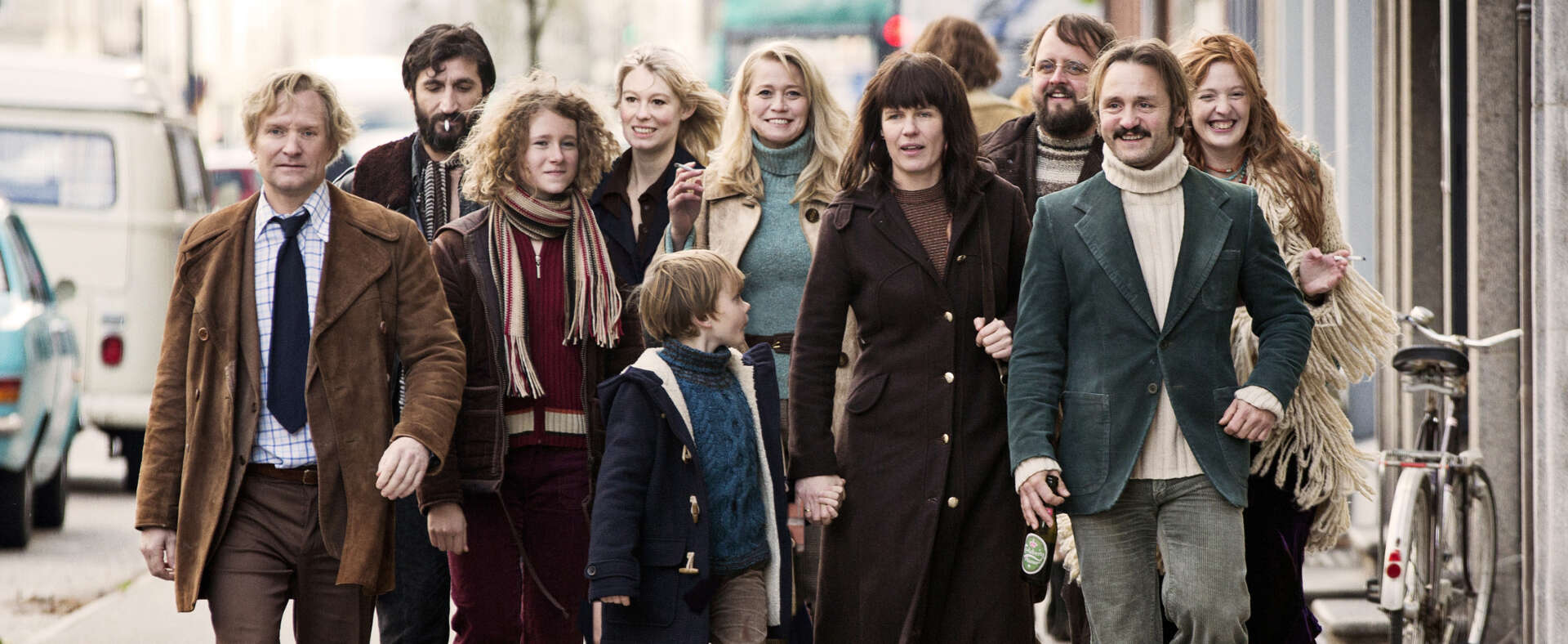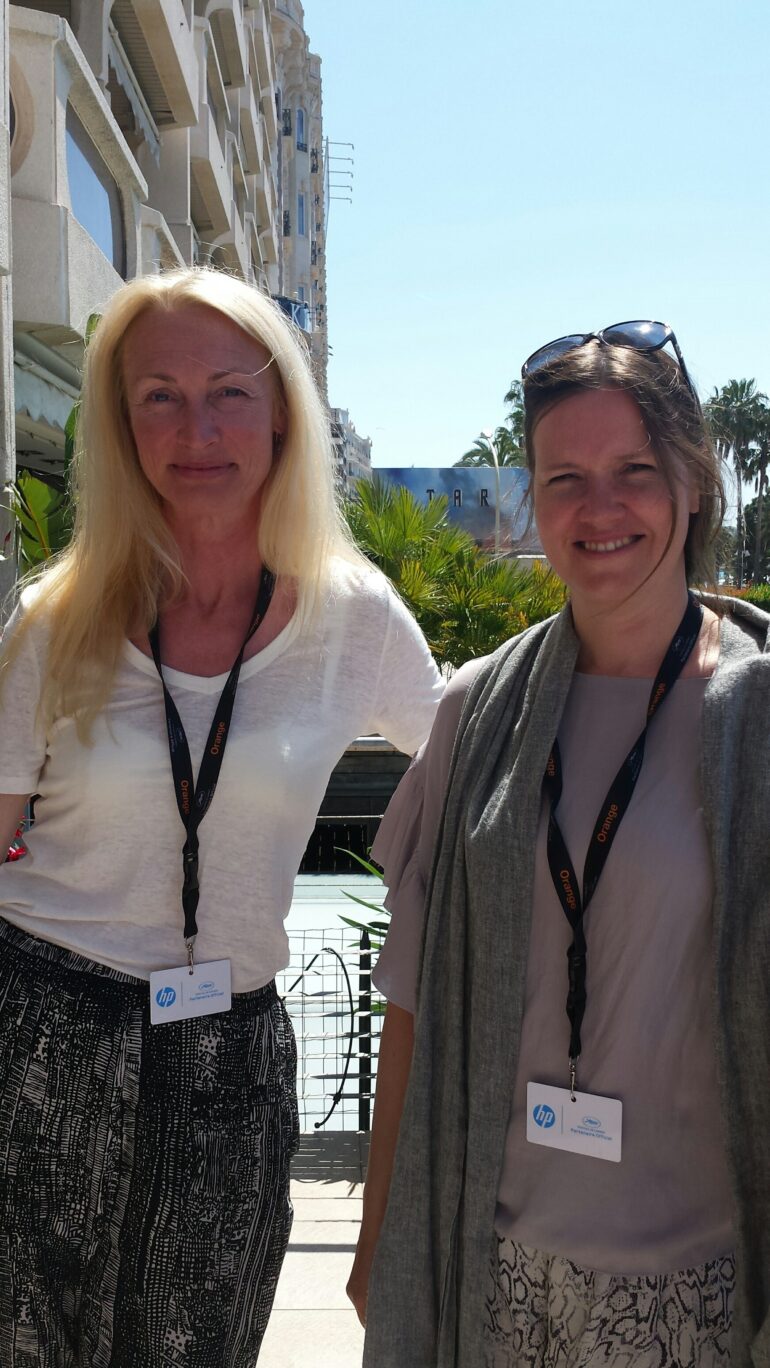
In this exclusive extensive interview, Zentropa’s leading producers Sisse Graum Jørgensen and Louise Vesth tell us about the company’s new management team following the stepping down of co-founder and CEO Peter Aalbæk Jensen and upcoming films.
The leading Danish production powerhouse has just passed a record 1.2 million admissions with three films in the first semester 2016 and has a strong production line up for 2017 with Lars von Trier’s The House that Jack Built, a gangster film by Kristian Levring, new films by Thomas Vinterberg and Christopher Boe.
Peter Aalbæk Jensen has stepped down from his position as CEO of Zentropa. How does that change the way the company is run today?
Louise Vesth: It has always been clear to us that Peter Aalbæk was going to step down, sooner or later. We knew it would be impossible to replace him with one single person, so we are now five people managing the company: Sisse and I, in charge of production, Anders Kjærhauge, Head of Legal, Frederick Nemeth, CFO and Rikke Ennis, TrustNordisk CEO, handling world sales. Anders is officially CEO, but in reality we share the managerial responsibilities.
Sisse and I almost started at the same time at Zentropa, some 16 years ago. We have the Zentropa modus operandi in our DNA which is basically to combine art with the market.
Sisse Graum Jørgensen: The way the company is structured now is very sturdy. It allows us to share our knowledge and our strengths. The Day will Come for instance is the first film on which Peter, Louise and I share the producer credit. We will continue to produce some films individually, but on bigger projects, we will collaborate much more in the future.
Many people believe that a five-person committee is not efficient in the decision-making process. But for us it’s a real strength. It allows us to move quickly. From the development stage, we discuss at the same time - not subsequently - the content and key elements - director, scriptwriter, cast - the market and financing opportunities. This smooth collaborative work at Zentropa is what defines us and our films.
Zentropa Sweden has several quality projects in the pipeline. How do you collaborate?
SGJ: Yes Madeleine Ekman [Head of Zentropa Sweden] has great projects. We work closely with her, co-producing and co-financing each other’s films. We share a lot of knowledge and meet once a month.
What other active outposts do you have? SGJ: Ingrid Sølverud is in charge of the Norwegian office. Elsewhere, we work with Bettina Brokemper in Cologne, Fabian Gasima and Henning Kamm in Hamburg, David Matamoros in Barcelona, we have a strong relationship with Marianne Slot in Paris and Gillian Berrie in Glasgow. We also work with various people in the UK but haven’t done a project there in a while.
In what way have the fast changes in the market affected the way you produce films today? LV: What is essential today is to keep a balance. You can keep on running, try to catch up on new business models and opportunities, but our strength is that we stay relatively small on an international level. We have a good feeling when we have something strong and then use this to open new doors.
Still the market has changed, with directors and talents such as Susanne Bier (usually a key director in your roster) now working on TV drama and in the UK and Hollywood. How do you deal with this trend? LV: We let the talents go because we believe that they will come back to make the films that are important to them.
SGJ: In today’s world where a lot is happening fast, you can try to figure out what happens, or focus on who you are and what you’re best at. This is what we do. We are good at developing strong European content. We have a highly efficient production structure, great relationships with key players in the industry. We look at each individual project and find tailor-made solutions. Certain projects are better adapted for traditional distribution; others are better for online viewing.
We will never standardise our output. Our religion is to adapt, innovate, remain loyal to each project and director. This is why we have no problem with Scandinavian directors going out in the world. We say YES, Go! We know that what we offer is unique. They can do their personal films and have final cut. They know that we are solid, experienced and very clear in terms of what we want to produce.
What’s the share of big and smaller projects in your annual output? LV: In the last 3-4 years we’ve moved away from personal dramas to stories that are more genre driven. Mid-budget personal dramas are the ones suffering in cinemas because people want to have THE big screen experience. It’s harder for dramas to attract larger crowds. Regarding smaller vs bigger projects, we actually don’t have rules. The size depends on the individual project.
With new digital players on the market, such as Amazon and Netflix, these are exciting times for storytellers and talents… LV: Yes of course. It’s our task to reach out to them. I believe in the natural way of things to happen.
What projects do you have in your pipeline for 2016-2017? Lars von Trier ‘s come back to feature film with The House that Jack Built made the headlines in Cannes…Wasn’t the project supposed to be a TV drama? LV: When he heard that everyone is doing TV drama, he changed his mind. What everyone else is doing, Lars is not doing. It’s too bad because I would have loved to do a TV drama with him. Otherwise we also have the fourth film in the Department Q series.
Who will direct? LV: We don’t know yet, but Nikolaj Arcel is writing it.
Then we have Peter Schønau Fog’s You Disappear. It’s in the editing stage and it will premiere early 2017.
SGJ: After the summer break I will finance Kristian Levring’s next project, written again by Kristian Levring and Anders Thomas Jensen [like The Salvation]. It’s a gangster drama set in the US during the Prohibition era. The script will be ready in August and I will start financing it in the autumn. It will be English language. I hope to shoot it by the end of 2017.
Together with Peter Aalbæk, we’re also working on the Viking project The Long Ships based on the bestselling novel Röde orm by Frans Gunnar Bengtsson. Tobias Lindholm is working on the script.
I have another project with Thomas Vinterberg that he will write and direct after the submarine disaster film Kursk produced by Europacorp in France. Tobias [Lindholm] is attached as well as writer. We will work on it in 2017. Then we have started working with Christopher Boe on a feature film.
We are very proud of this promising 2016-2017 slate. We have a huge diversity, and all projects have very strong scriptwriters/directors attached. Then of course, I‘m following what Susanne Bier is doing and we are always bouncing ideas off each other. For the moment she is travelling, promoting The Night Manager.
What about TV drama? LV: Rikke Ennis has a few TV drama projects that she is packaging with other companies. The problem right now in Denmark is that DR is the closest broadcaster to what we do, but they produce mostly in-house. I think that to go into TV drama, we need to have projects that fit our profile.
You do deliver year after year auteur-driven films that strike a chord with audiences both nationally and internationally, so it’s better to continue to focus on this working recipe… SGJ: I think that our success comes from our auteur signature films. People might say: ‘Zentropa is not rock’n roll arthouse-oriented anymore’. This is not true. Our films continue to be as original as ever, but our quality has just gone up. We want as many people as possible to discuss our films and use films to mirror people’s lives and society as a whole. The Hunt was a perfect example of a tough subject matter that reached large audiences around the world and now Jesper W. Nielsen’s The Day Will Come which deals with another difficult subject matter is doing good business in Denmark.
In fact, the film has passed 214,000 admissions and together with The Commune and A Conspiracy of Faith, we have now crossed 1.2 million admissions in Denmark which represents nearly half the average annual domestic admissions for Danish films. This is a great achievement which proves again that we’ve become better at producing high quality films that reach the marketplace locally and internationally at the same time. This is our goal at Zentropa and what defines us.
